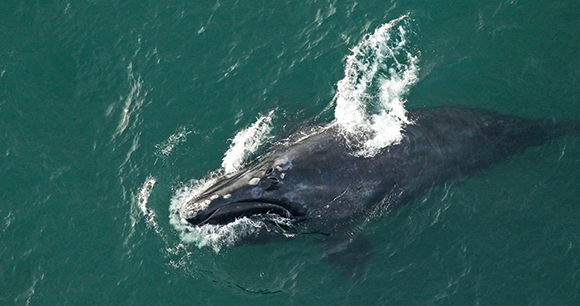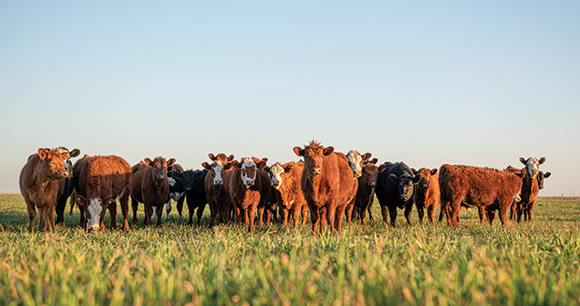For animals and those who care about their welfare, the outlook in our nation’s capital is bleak. In January, the second Trump administration and majority leadership in the 119th Congress assumed office with the stated objectives of dismantling many federal agencies and programs, including those responsible for protecting and regulating the treatment of animals, and of rolling back key environmental and animal protection laws.
The previous Trump administration presided over an unprecedented series of actions that weakened animal protections. While some of the damage was undone during the intervening years, a flurry of executive orders issued since President Trump returned to the White House served as the initial volley in an accelerated and amplified assault on animal welfare.

This landscape makes AWI’s work far more challenging and far more urgent. Though difficult times are ahead, one of AWI’s most powerful assets has always been the collective engagement of our members, who unfailingly respond to our calls to contact legislators, other government officials, and corporate leaders to voice support for protecting animals. In the midst of this current concerted assault, such engagement takes on heightened importance.
This article highlights nine critical animal protection statutes that face the greatest risk of being undermined in the coming months and years. AWI was instrumental in getting many of these laws enacted with widespread bipartisan support. Today, we rely on them extensively to advance our mission, and we need your help to defend them.
This article also highlights proactive opportunities to support certain federal and state measures that would strengthen animal protections. Lastly, we will tell you how you can use AWI’s Action Center to enhance your engagement on important issues. Above all, and by whatever available means, please continue to speak up for animals. Your voice matters—now more than ever.
Animal Welfare Act
The Animal Welfare Act (AWA) of 1966 is the main federal law that establishes minimum standards of humane care for animals in research, public display (including circuses, aquariums, and roadside zoos), and commercial trade (including breeders and dealers). Not all animals are covered, nor all uses, but the law does protect many animals from suffering—when it is enforced properly. Achieving adequate funding for such enforcement has tended to be a bipartisan effort.
AWI is taking a number of steps to head off efforts to cut staffing and funding and otherwise curtail enforcement and discourage inspectors from doing their jobs. Even as we seek to shield the AWA from attempts to weaken it, we are also working to fix longstanding issues with the enforcement mechanisms and to ensure that suffering animals are removed from abusive conditions. This includes tightening the inspection process and closing loopholes in the licensing process to prevent chronic violators from staying in business.
Endangered Species Act
The 1973 Endangered Species Act (ESA) is the world’s most powerful and successful conservation statute. It currently protects around 2,400 domestic and foreign species that are listed as threatened or endangered. The goal of the ESA is to prevent extinction by safeguarding members of the species while conserving the ecosystems necessary for populations to recover.
Once a species is listed as endangered or threatened under the law, it is protected from “take,” which includes killing, wounding, and harassing. AWI’s terrestrial and marine programs have used the ESA to help save the red wolf from extinction in the wild and champion greater protections for critically endangered North Atlantic right whales and vaquita porpoises. In recent years, petitions from AWI and allies resulted in ESA listings for the Taiwanese white dolphin and the Atlantic humpback dolphin and a pending proposal by the US Fish and Wildlife Service (USFWS) to list the pygmy three-toed sloth. We also focus on limiting commercial trade of species listed under the Convention on International Trade in Endangered Species of Wild Fauna and Flora (CITES), which the United States implements through the ESA.

The ESA experienced extensive regulatory rollbacks under the first Trump administration. While the Biden administration partially reversed these rollbacks, the current Trump administration has issued an executive order to rescind the Biden-era regulations. Last Congress, we fought off 115 legislative attacks on the ESA. Many of those same bills or amendments have already been reintroduced, so we must continue the fight to preserve this vital law. With 1 million species globally at risk of being lost forever, the ESA is the best tool that we have to stem the tide of extinction.
Marine Mammal Protection Act
Marine mammals are vital to ocean ecosystems. Recognizing the threats these species face from human activities, Congress set a global standard for conservation in 1972 by passing the Marine Mammal Protection Act (MMPA) with bipartisan support. The MMPA prohibits harassing, hunting, capturing, or killing marine mammals without federal authorization. Regulation under the law extends to unintentional harm such as fisheries bycatch, as well as permits for public display, scientific research, and “enhancement” (i.e., activities to aid recovery) of marine mammal species or populations.
There have been remarkable conservation successes under the MMPA. Pinnipeds such as the northern elephant seal and California sea lion, and cetaceans such as the humpback whale and bottlenose dolphin, have rebounded since the law’s enactment. Yet myriad threats to marine mammals persist—most notably, continued global fisheries bycatch, ship strikes, marine pollution, anthropogenic ocean noise, and climate change. AWI remains committed to safeguarding marine wildlife by defending the MMPA from harmful amendments and working to shield the agencies that implement this vital law from funding, programmatic, and staffing cuts. With ongoing challenges, public support is crucial to our advocacy for science-based policies that fulfill the mandate of the MMPA.
National Environmental Policy Act
The National Environmental Policy Act (NEPA), signed into law in 1970, is the national charter for the protection of the environment. NEPA’s primary function is to promote efforts to prevent or mitigate damage to the environment from federal activities. It requires federal agencies to use the best information and rigorous scientific analysis to assess significant environmental impacts of projects before they begin and to consider a range of mitigation alternatives.
Wildlife management plans, logging, highway construction, mining, oil and gas exploration, and power plant construction are some of the projects that may be subject to NEPA review. Factors considered in such reviews include impacts on wildlife (including protected species), habitat, animal welfare, air and water quality, climate change, environmental justice, and public health.
AWI uses NEPA, among other ways, to contest plans to kill certain wildlife populations in national parks and wildlife refuges, to challenge the lethal control conducted by the US Department of Agriculture’s Wildlife Services program, and to protest wild horse and burro roundups.
The current administration has taken extraordinary measures to gut NEPA by issuing an interim final rule that will rescind over 50 years’ worth of regulations that implement the statute, sowing profound uncertainty for conservationists and industry alike. AWI will fight all efforts to eviscerate NEPA implementation and to avoid the public scrutiny and participation that is essential to fulfilling NEPA’s fundamental purpose: to preserve wildlife, wild lands, and a healthy environment.
Humane Methods of Slaughter Act
Enacted in 1958, the Humane Methods of Slaughter Act (HMSA) is one of only two federal statutes explicitly aimed at promoting farmed animal welfare. The law requires that livestock be slaughtered using “humane methods” that are “rapid and effective” and render the animals insensible to pain prior to their being shackled, hoisted, or cut. USDA regulations implementing the law also prohibit certain forms of abuse while animals are in slaughter plants, such as beating them with pipes and dragging disabled animals.

While it offers meaningful protections, the HMSA falls short in many ways. The USDA has thus far interpreted the law to apply only to mammalian livestock such as cattle and pigs and not to birds, who constitute roughly 98 percent of the land animals killed for food in the United States each year. Further, HMSA regulations do not address important aspects of the slaughter process such as worker training and maintenance of stunning equipment.
AWI campaigns for regulatory reforms to address these shortcomings, and we monitor and report on evidence of abuse at slaughter facilities and on the effectiveness of the USDA’s enforcement efforts. Where there is evidence of repeated or egregious mistreatment, we seek permanent suspensions of plant operations and criminal prosecutions for animal cruelty. We also oppose ongoing efforts in Congress to expand special exemptions that allow plants to skirt regular federal inspection.
Horse Protection Act
The Horse Protection Act (HPA) was enacted in 1970 to prevent the “soring” of Tennessee walking horses. Soring involves deliberating inflicting pain on a horse’s hooves and legs to elicit an unnatural, high-stepping gait for competition.
Despite the HPA’s enactment, soring abuse has persisted for decades—largely due to an inadequate inspection system whereby horse shows are permitted to appoint their own inspectors. Both a USDA Office of Inspector General audit and a National Academies of Sciences, Engineering, and Medicine report emphasized the inherent conflicts of interest with the current industry-run inspections that allow soring to persist.
Regulations to strengthen the HPA and reform the inspection system—over a decade in the making and widely supported by the public, members of Congress, veterinary groups, and other stakeholders—were slated to go into effect on February 1 of this year. The USDA, however, has postponed full implementation until at least February 1, 2026.
A prior iteration of these regulations was frozen by the first Trump administration in 2017. As rationales for postponement this time around, the USDA cited ongoing litigation brought by the Tennessee Walking Horse National Celebration (the largest show for the breed), as well as the “Regulatory Freeze Pending Review” presidential memorandum issued on Trump’s first day back in office. AWI will continue to urge adoption of these long-awaited regulations, which cannot come too soon for the Tennessee walking horses who endure this senseless cruelty.
Wild Free-Roaming Horses and Burros Act
AWI’s efforts to protect wild equines date back almost to the organization’s founding, during an era when mustangs were routinely rounded up and slaughtered. The 1971 Wild Free-Roaming Horses and Burros Act was enacted because equines were “fast disappearing from the American scene.”
The law tasked the Bureau of Land Management and the US Forest Service with humanely managing our nation’s wild herds. Over the years, however, both agencies have pursued a misguided and reckless approach predicated on mass roundups, whereby horses are permanently removed from the range and shunted into off-range holding for the rest of their lives. According to BLM data, over 68,000 wild equines are currently in holding while roughly 73,500 remain on the range across millions of acres of designated habitat in 10 western states.
Although countless Americans cherish wild equines and the beauty and freedom they represent, some special interests continue to push for lethal population control and even commercial slaughter to drastically reduce the number of wild horses and burros on the range. AWI has long worked to ensure that annual federal spending packages include provisions that bar such inhumane options. Moreover, we’ve worked to secure language directing the BLM to increase its use of immunocontraceptive vaccines—a humane alternative to brutal and chaotic helicopter roundups that would allow herds to remain relatively undisturbed in their natural habitats. We continue to fight for wild horses in the courts as well: Our lawsuit to stop the BLM from eliminating millions of acres of designed wild horse habitat in Wyoming is currently before the US Court of Appeals for the Tenth Circuit.
Organic Foods Production Act
The recently revised organic livestock and poultry standards apply to animals raised under the National Organic Program (NOP), established under the Organic Foods Production Act of 1990. They are the first federal care standards created for any farmed animals while they are on farms. For animals within the NOP, the regulations now prohibit certain types of mutilations, such as cutting off the tails of pigs and cattle, cutting off the beaks of chickens, and cutting strips of skin off the buttocks of sheep (a process known as “mulesing”). They also prohibit extreme confinement, require outdoor access, and prohibit transport of animals unfit to travel.
AWI was extensively involved in the development of these standards. In January 2017, the Obama administration finalized a prior version of the regulations, but the first Trump administration withdrew them. However, the Biden administration revived the process and finalized the regulations in 2023. The current Trump administration has not yet indicated an intent to withdraw them, but if it does, AWI stands ready to defend them. While not perfect, the organic welfare standards improve the lives of millions of farmed animals and better align the USDA Organic label with consumer expectations regarding the welfare of animals raised organically.
Migratory Bird Treaty Act
The 1918 Migratory Bird Treaty Act (MBTA) protects over 1,100 species of birds and their eggs from take (including killing, capturing, selling, trading, and transport) without a permit. This prohibition covers both intentional take and incidental killing stemming from an otherwise lawful activity.
During the first Trump administration, the USFWS issued a new policy reversing the agency’s decades-long interpretation that the MBTA prohibits the incidental killing of migratory birds protected under the law. This change was implemented to shield the oil and gas industry and electric utilities from liability for the millions of birds their operations kill each year. It allowed these industries to forego reasonable and cost-effective precautions to avoid deaths. While this policy was deemed by a court to be illegal and was reversed by the Biden administration, the current Trump administration has issued an executive order to reinstate it. If the reinstated policy is allowed to stand, it will likely once again cause the deaths of millions of birds in the coming years.
Proactive 2025 Priorities
While we are strongly focused on maintaining the integrity of the important federal laws outlined above, we are also campaigning for state and federal bills that would advance animal protections in other areas. The following are some of the bills we are rallying support for in Congress:
- Save America’s Forgotten Equines (SAFE) Act, to prohibit the slaughter of horses in the United States for human consumption and the export of live horses for the same purpose
- Child and Animal Abuse Detection and Reporting Act, to require that data collected by the federal government from state child protection agencies include information about animal abuse as a risk factor for child abuse
- Opposing the Cultivation and Trade of Octopus Produced through Unethical Strategies (OCTOPUS) Act, to prohibit the commercial farming of octopus in the United States and the importation of octopus from commercial farms elsewhere
- Developing Alternative Mitigation Systems (DAMS) for Beavers Act, to establish a federal grant program to fund the use of nonlethal beaver management systems
- Strengthening Welfare in Marine Settings (SWIMS) Act, to phase out the captivity of larger cetacean species such as orcas and beluga whales
- Captive Primate Safety Act, to end the pet primate trade in the United States
At the state level, we are seeking to advance bills on a range of topics, including the following:
- Restricting mink farming and banning the sale of new fur products
- Expanding prohibitions on exotic pet ownership
- Ending wildlife killing contests
- Strengthening coordination between law enforcement and other agencies related to domestic violence and animal abuse
- Prohibiting gestation crates, battery cages, and other forms of extreme confinement of farmed animals
- Updating fire safety codes to prevent deadly barn fires
- Reforming aquaculture practices, such as prohibiting net pen fish farming
- Prohibiting the use of wild animals in traveling shows
AWI’s Action Center
AWI’s Action Center keeps you informed and provides simple ways to take action on important measures. You’ll be notified via email when key animal welfare legislation and policies are under consideration in Congress, the White House, state legislatures, federal and state agencies, company boardrooms, and other influential forums around the world. The email messages will link to our Action Center, from which you can quickly and easily contact federal and state policymakers, draft regulatory comments, and sign petitions.
Your voice is important, and together, our voices make a difference. If you are not already signed up for our alerts and would like to be, please visit awionline.org/alerts. Given the current climate in Washington, we must continue to be a voice for the voiceless—defending hard-won animal protections and seeking to improve animal welfare in pursuit of our grand vision: a world where no animal suffers because of humans.